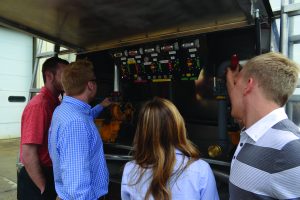
Industrial Engineering Design (IE 441) is the one-semester senior design course where students engage in industry projects and practice industrial engineering under the guidance of an experienced Registered Professional Engineer, as well as engineers and managers from the sponsor company. The objective of these projects is to provide economic value to the company and a practical education to the students.
The average three-year net payback for 62 projects over the last five semesters is $137,800, estimated by the sponsor companies and then verified by CIRAS (Center for Industrial Research and Service), serving as a third-party assessment. CIRAS also helps connect the companies to the student projects for the course.
One hundred percent of the projects are based in industry and give the students real problems to work on, with real constraints.
Dave Sly, professor of practice in industrial and manufacturing systems engineering, is the instructor for the course. He has been happy to see that the increased focus on client value has delivered great results for the companies as well as the students.
“The competitive nature of the students has shown through, as each semester’s group has outperformed on value over the previous semester,” he said.
The projects involve four stages of design (Problem Definition, Current State Analysis, Future State Design, and Final Project Validation/Delivery). Students are required to perform in-depth quantitative analysis and design throughout the entire project with a group commitment of 40 hours per week for 14 weeks.
Almost all of the companies are in Iowa, because extensive on-site and web/phone company involvement is necessary to ensure success. The groups are required to visit the companies at least five times per semester, but average more than ten visits.
Examples of other projects include a team working with Drake University to look at office efficiency, how information is presented to students, staffing, and office layout. A project with Hy-Vee distribution centers asked students to address efficiency of order placement and turnover in warehouses located in Chariton and Cherokee. Fifteen projects were completed in Spring 2016, an increase from 12 projects in Fall 2015.
The participating companies include many manufacturing companies, and range from Fortune 500 companies to smaller companies with 30-40 employees. Companies that have participated in the program include Hagie, Tone’s, Kinze, Lennox, John Deere, Rockwell Collins, Whirlpool and Iowa Health System, among others. About 60 percent of the companies return the following semester to participate again.
The hands-on experience the students get from these projects is invaluable, and is enhanced by the limit of four students to a team, ensuring each student has a lot of work to do on the project.

Seneca Tank project
A Spring 2016 student group worked with Seneca Tank on the Ready-To-Deliver 2700 tank truck. Seneca Tank is located in Des Moines and is an international supplier of new and used petroleum tank trucks, transports, and truck tank parts. The students made recommendations to the company that would increase efficiency in the assembly process and introduce kits with standardized parts into the production process.
The student team members working on the project were industrial engineering students Emilee Nyberg, Matt Ehresmann, Justin Danko and Daniel Thayer. The team addressed issues with variability in Seneca Tank’s manufacturing process of the Ready-To-Deliver 2700 tank truck, and had a one-year economic payback of $600,000.
“The solutions we recommended focused on introducing kits into their production process to standardize the parts used and quantities needed for production,” Ehresmann said. “We also made recommendations to increase the efficiency of their assembly process by reducing parts and operations.”
The students can see the benefits the class project will have on their future careers.
“I believe that IE capstone is such a successful class because we get to take everything we learned in the classroom and apply it to the real world and truly make an impact on a company,” Nyberg said.
The IMSE Department has increased its undergraduate curriculum focus on the practical experience students can gain.
“I believe that the IMSE capstone design course represents the IMSE curriculum perfectly. The curriculum focuses on applying industrial engineering principles within industry and that is what the IMSE capstone is all about. I believe this focus helps prepare students for the transition between academia and industry.” Ehresmann said.
The students really enjoyed working with the employees and engineers at Seneca Tank, and the feeling was mutual.
“Seneca Tank is continually amazed by the capability and professionalism possessed by the students of Iowa State’s Department of Industrial and Manufacturing Systems Engineering. We count it a privilege to support the program, and work side by side with these teams,” said SJ Risewick, the student team’s contact at Seneca Tank.